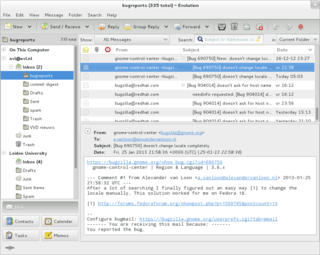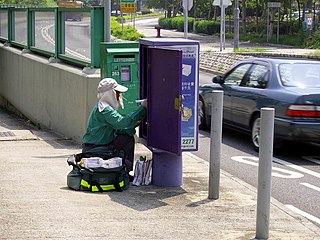Mail is a system for physically transporting postcards, letters, and parcels.
Contents
Historically, mail specifically meant a bag containing letters to be delivered by post.
Mail or The Mail may also refer to:
Mail is a system for physically transporting postcards, letters, and parcels.
Historically, mail specifically meant a bag containing letters to be delivered by post.
Mail or The Mail may also refer to:

Electronic mail is a method of transmitting and receiving digital messages using electronic devices over a computer network. It was conceived in the late–20th century as the digital version of, or counterpart to, mail. Email is a ubiquitous and very widely used communication medium; in current use, an email address is often treated as a basic and necessary part of many processes in business, commerce, government, education, entertainment, and other spheres of daily life in most countries.

An email client, email reader or, more formally, message user agent (MUA) or mail user agent is a computer program used to access and manage a user's email.

The mail or post is a system for physically transporting postcards, letters, and parcels. A postal service can be private or public, though many governments place restrictions on private systems. Since the mid-19th century, national postal systems have generally been established as a government monopoly, with a fee on the article prepaid. Proof of payment is usually in the form of an adhesive postage stamp, but a postage meter is also used for bulk mailing.

Webmail is an email service that can be accessed using a standard web browser. It contrasts with email service accessible through a specialised email client software. Additionally, many internet service providers (ISP) provide webmail as part of their internet service package. Similarly, some web hosting providers also provide webmail as a part of their hosting package.
Post, POST, or posting may refer to:
Messenger, Messengers, The Messenger or The Messengers may refer to:
Various anti-spam techniques are used to prevent email spam.
Microsoft Exchange Server is a mail server and calendaring server developed by Microsoft. It runs exclusively on Windows Server operating systems.
Address munging is the practice of disguising an e-mail address to prevent it from being automatically collected by unsolicited bulk e-mail providers. Address munging is intended to disguise an e-mail address in a way that prevents computer software from seeing the real address, or even any address at all, but still allows a human reader to reconstruct the original and contact the author: an email address such as, "no-one@example.com", becomes "no-one at example dot com", for instance.
Spark commonly refers to:
Express, The Expresss or EXPRESS may refer to:
A beacon is an intentionally conspicuous device designed to attract attention to a specific location.
The following tables compare general and technical features of notable non-web-based email client programs.
Email harvesting or scraping is the process of obtaining lists of email addresses using various methods. Typically these are then used for bulk email or spam.
Courier Mail may refer to:
App, Apps or APP may refer to:
A courier is a person, company or vehicle that transports mail and small items.

Outlook.com, formerly Hotmail, is a free personal email service offered by Microsoft. This includes a webmail interface featuring mail, calendaring, contacts, and tasks services. Outlook can also be accessed via email clients using the IMAP or POP protocols.
Hybrid mail is mail that is delivered using a combination of electronic and physical delivery. Usually, it involves digital data being transformed into physical letter items at distributed print centres located as close as possible to the final delivery addresses. An e-mail letter is a letter which is sent as an email using a computer, then printed out and delivered as a traditional (physical) letter.

MSN Dial-up is an Internet service provider operated by Microsoft in the United States and formerly also in several other countries. Originally named The Microsoft Network, it debuted as a proprietary online service on August 24, 1995, to coincide with the release of Windows 95. In 1996 and 1997, a revised web-based version of the ISP was an early experiment at interactive multimedia content on the Internet.